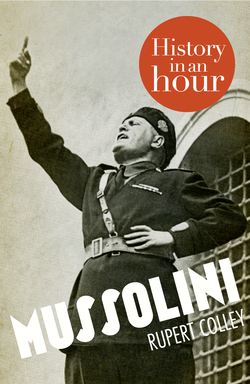Читать книгу Mussolini: History in an Hour - Rupert Colley - Страница 5
Risorgimento
ОглавлениеItaly, as a nation, had only been in existence since 1861 – when Victor Emmanuel II of Piedmont was declared king of the new Kingdom of Italy. Before unification, Risorgimento, Italy had existed as a number of independent states often under the rule of a foreign power. Only Rome resisted unification, despite it being designated capital, until, in 1870, it too had been incorporated, albeit forcibly, into the new nation state.
The high ideals and excitement of existing as one state evaporated as deeply ingrained political divisions, widespread poverty and deep-rooted corruption blighted the nation in its infancy.
Nature had already ensured that Italy suffered from a north–south divide. The climate and poor soil rendered the southern half of the country far harder to cultivate and for its population, of whom 90 per cent were still illiterate by the turn of the twentieth century, an existence of hardship and sometimes near starvation. Their situation was too often exacerbated by the equally divisive north–south political divide. Power was entirely rooted in the north, a system riddled with corruption, bribery and selfishness. From unification to the outbreak of the First World War in 1914, Italy had no less than twenty-three prime ministers, each governing with a series of ineffectual coalitions that failed to address the many pressing questions affecting the country as a whole. Rendered impotent, the king was unable to intervene, nor, following his death, was his son, Umberto I, who was assassinated in 1900.
For the mainly rural south, unification brought no benefits and only the scourges of higher taxation and conscription. The franchise, limited to the literate, property-owning classes, effectively excluded much of the southern population. Many southerners were attracted to the socialists or anarchists whose members sought to exploit their grievances for their own ends. Corruption was as rife in the south as it was in the north, giving rise to ruthless gangs, from which emerged the Sicilian-based Mafia.
Amidst this chaos was the Pope. Unification had stripped Pius IX of his vast territories stretching across central Italy, the Papal States, leaving him, by the Law of Guarantees of 1871, only the immediate area surrounding St Peter’s Church in Rome. Pius IX (at almost thirty-two years, the longest-serving Pope) and subsequent popes, refusing to recognize the Italian king or the Kingdom of Italy, declared themselves prisoners of the Vatican and refused to step outside its confines. Church and State were at loggerheads, a situation referred to as the ‘Roman Question’, and were to remain so until Mussolini’s deal with the Vatican in 1929.
Much of the division that straddled and defined Italian society at the turn of the century was embodied by a typical married couple living in a small village near the northern Italian town of Predappio in Forli. He, a blacksmith, was an atheist and a republican. Uneducated, he learnt to read and write, and, as an ardent socialist, was often arrested for his political activities. She, a traditionalist, was a devout Roman Catholic, and while her husband was out, agitating or drinking, worked as a teacher to maintain the family home. On 29 July 1883, she gave birth to a son. Her husband insisted he be named after three socialists he admired. Hence Alessandro and Rosa Mussolini named their firstborn Benito Amilcare Andrea.
